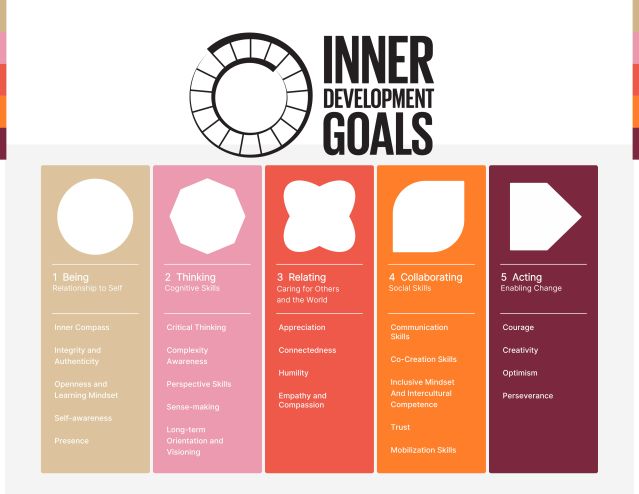Environment
23 Inner Development Goals for Environmental Sustainability
Exploring a new initiative to encourage sustainability.
Posted November 3, 2023 Reviewed by Gary Drevitch
Key points
- The Inner Development Goals provide a framework for personal development and environmental sustainability.
- The 23 skills and qualities are designed to help foster more sustainable behaviours.
It's increasingly recognized that to achieve environmental sustainability we need to go beyond superficial fixes and instigate deeper cultural shifts. This means changes to self-identity and worldviews to enable pro-environmental behaviours, which also catalyze wider institutional change. For example, the United Nations Environment Programme suggests that “only a fundamental, system-wide transformation across technological, economic and social factors, including paradigms, goals and values can reverse the current trends that threaten the well-being of present and future generations and the survival of other species.”
Inner Development Goals
In my own work, I've come to a similar conclusion that, although the planetary environmental crisis is proximately driven by our economic and political institutions, these are ultimately underpinned by our worldviews. As a consequence, I've shifted my research focus from natural sciences to deeper integration with the social sciences and humanities to develop more meaningful sustainability solutions. This led me to become curious about a new initiative called the Inner Development Goals (IDGs), and so I attended their second annual summit in Stockholm in October 2023 to hear what they have to say.
The IDGs were launched in 2020 by experts and practitioners in leadership development and sustainability. Its organizers aim to foster a "science-based understanding of inner development, and what is needed to support a sustainable future." At the summit event in Stockholm, the IDG Framework was announced. It has five dimensions—being, thinking, relating, collaborating, and acting—associated with 23 skills and qualities. To a degree, promoting these attributes might seem obvious, but it's important to consider how many organizations have a limited focus on values and attitudes. It's fundamental to many organized religions, of course, but the shift to a more secular society in many countries has arguably left a vacuum around inner development.

Considerations
One consideration I had was whether the IDG framework really goes "deep enough" to enable genuine transformations toward sustainability. The skills and qualities described don’t challenge our fundamental sense of self-identity—our relationships to others and the natural world—which organisations like the European Environment Agency are now considering to be at the heart of many environmental problems. The Intergovernmental Platform on Biodiversity and Ecosystem Services, an international organization of scientists akin to the IPCC but for biodiversity, suggests that “pathways to sustainability will require shifts from broad values of individualism and economic profit to sustainability-aligned values of collectivism, care and equality.” Can this fundamental pivoting of values occur simply by focusing on the IDG framework, and, if not, what more needs to be done?
Another thought I had was the risk of forgetting that initiatives to create progressive inner change occur in an increasingly challenging era of global environmental and social crisis, which results in many influences on people’s mindsets and attitudes. For example, environmental crises such as floods, pandemics, and food shortages can create a survival mentality, both at the individual and national level. This may hinder the interpersonal and international co-operation needed to mitigate further crisis. It’s these kinds of vicious cycles that initiatives for inner development are up against.
Fortunately, it’s unlikely to be the case that people will simply give up on inner development in times of crisis. Psychologist Abraham Maslow, famous for his Hierarchy of Needs theory, argued that basic physiological and safety needs can be pursued simultaneously with "higher" needs around self-actualization and self-transcendence. History teaches that in times of crisis like war, the urge to seek religious or spiritual guidance doesn’t disappear and maybe even increases.
Perhaps as the environmental crisis worsens, the role of IDGs and even spiritual development more generally will become more important. I'm not quite sure if this is an optimistic thought or not, yet it certainly emphasizes this as relevant research to pursue and highlights the potentially huge importance of the IDGs in times to come.


